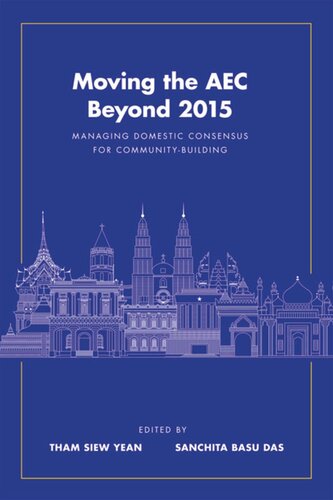

Most ebook files are in PDF format, so you can easily read them using various software such as Foxit Reader or directly on the Google Chrome browser.
Some ebook files are released by publishers in other formats such as .awz, .mobi, .epub, .fb2, etc. You may need to install specific software to read these formats on mobile/PC, such as Calibre.
Please read the tutorial at this link: https://ebookbell.com/faq
We offer FREE conversion to the popular formats you request; however, this may take some time. Therefore, right after payment, please email us, and we will try to provide the service as quickly as possible.
For some exceptional file formats or broken links (if any), please refrain from opening any disputes. Instead, email us first, and we will try to assist within a maximum of 6 hours.
EbookBell Team

4.7
26 reviewsThe ten Southeast Asian economies reached a milestone on 31 December 2015, when they announced the formation of an ASEAN Community. Although this includes three pillars – ASEAN Political-Security Community, ASEAN Economic Community (AEC) and the ASEAN Socio-Cultural Community – it is the economic pillar that generates immense debate, due to its expected quantifiable benefits to member countries. This book, thus, focuses on the ASEAN Economic Community and seeks to explain the need for building domestic consensus within the member countries. It starts with an overview chapter describing the current achievements of the AEC. It then explores possible explanations for the achievements/non-achievements and offers a hypothesis on conflicting economic interests in a country as one possible explanation for gaps in implementation. This is because any form of economic liberalisation brings with it the winners and losers, thereby raising resistance to liberalization measures and slowing down the implementation process. The book includes six country chapters – Indonesia, Malaysia, the Philippines, Singapore, Thailand and Vietnam - that examine sources of domestic conflict/s in greater detail and depth. It also includes a regional chapter, co-authored by the ex-Secretary General of ASEAN, Mr Rodolfo Severino, that brings out the political nature of ASEAN economic cooperation since its inception in 1976. For ASEAN beyond 2015, the book articulates the need to obtain a strong domestic consensus that supports the integration initiatives of the AEC. This can be viewed as a way forward to accelerate and deepen integration within ASEAN. The book concludes with some suggestions on how each country can move towards achieving domestic consensus, based on the respective country level analysis.